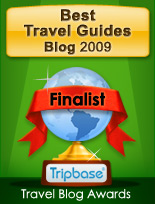 Five more reasons why I think Ramadan is a fabulous time to visit the Middle East, continued from part 1:
Five more reasons why I think Ramadan is a fabulous time to visit the Middle East, continued from part 1:
5. Lively Nights – by contrast to the somnolent days, Ramadan nights are spirited. After Iftar (when everyone breaks their fast at sunset) the streets come alive. Whole cities are on the move as people pile into their cars to visit family and friends. Hotels hold Iftar buffets and set up special Ramadan tents and the nights are long.
6. Ramadan is a good excuse to watch TV – remember the good old days before the Internet, Google, Facebook, e-Bay and Twitter, when families and friends used to sit around and bond as they watched TV together? Ramadan is all about a return to such good old-fashioned fun. A high-ratings period in the Middle East, all the best Arabic-language programs (game shows, talk shows, melodramatic serials) premiere, some made especially for Ramadam.
7. Iftar – the main meal of the day after the break of the fast is shared by families at home or worshippers at mosques who tuck into a communal meal together, spread picnic-like on the ground. Muslim and non-Muslims alike also head out for lavish Iftar buffets. Every hotel holds them and they’re great value, a must for travellers! At hotels in the UAE, there’s also a Ramadan tent with cushions and carpets where you can enjoy sheesha while you play traditional games and listen to oud music.
8. Succulent Dates and Sweets – many Muslims break their fast with dates and milk, a tradition dating back to the Prophet Mohammad who broke his fast with this humble meal before prayer. Platters of dates are always present at Iftar buffets and on coffee tables during Ramadan, along with traditional Arabic sweets such as the tasty katayef, a deep-fried pastry of ricotta, crushed walnuts, and sweet lemon and rosewater syrup - a great way to get that much-needed energy boost.
9. It ends with a holiday – Eid Al Fitr marks the end of Ramadan. For Muslims, the three-day long celebration begins with prayers and visits to family to exchange gifts. Then everyone’s off to the malls to the movies. Eid is the busiest time of year for cinemas, much like the post-Christmas period in the West. Once the Moonsighting Committee does its job, we’re usually on a plane somewhere. Especially if that three-day Eid joins up with a weekend, we get a nice long break.
The photo? The dome and minaret of a typical mosque in the United Arab Emirates, this one at Abu Dhabi.
 Only two of the nine countries we visited in the last six months were new to us, places we hadn’t been before and were experiencing for the first time. Obviously, as travel writers, it’s inevitable that we end up returning to places time and time again, particularly as we develop expertise in certain places, as my husband Terry and I have with the Middle East where we've been based since 1998. But while I love the excitement and energy of the new and relish opportunities to get out of our comfort zone and go somewhere we haven't been before (there’s nothing quite like that first drive from an airport into a new city, is there?), I also enjoy returning to places we’ve been before, some times many times before. Because there is a certain affection that grows over time as you become more familiar with a place, don’t you think? The more you visit, even if you’re not exactly besotted by the destination, the more you come to develop a bundle of warm feelings for it. And when you return… well, it’s just like seeing an old friend again. Love them or hate them, you just want to hug them! What do you think? Know those feelings? Which do you prefer? The familiarity that comes with the known or the excitement of the unfamiliar?
Only two of the nine countries we visited in the last six months were new to us, places we hadn’t been before and were experiencing for the first time. Obviously, as travel writers, it’s inevitable that we end up returning to places time and time again, particularly as we develop expertise in certain places, as my husband Terry and I have with the Middle East where we've been based since 1998. But while I love the excitement and energy of the new and relish opportunities to get out of our comfort zone and go somewhere we haven't been before (there’s nothing quite like that first drive from an airport into a new city, is there?), I also enjoy returning to places we’ve been before, some times many times before. Because there is a certain affection that grows over time as you become more familiar with a place, don’t you think? The more you visit, even if you’re not exactly besotted by the destination, the more you come to develop a bundle of warm feelings for it. And when you return… well, it’s just like seeing an old friend again. Love them or hate them, you just want to hug them! What do you think? Know those feelings? Which do you prefer? The familiarity that comes with the known or the excitement of the unfamiliar?






























